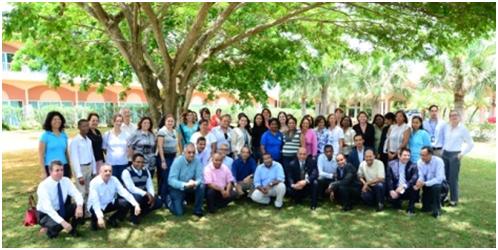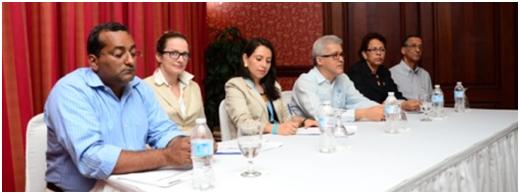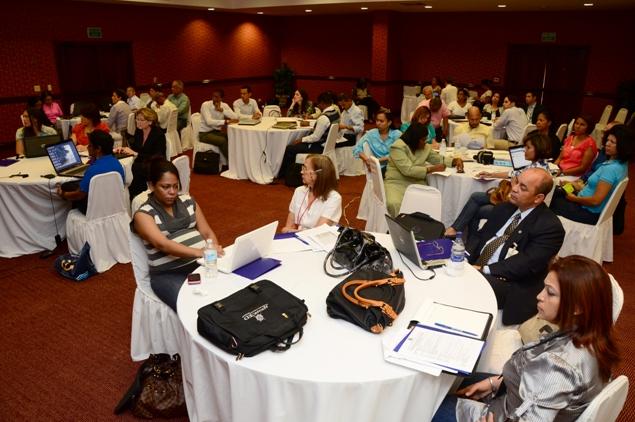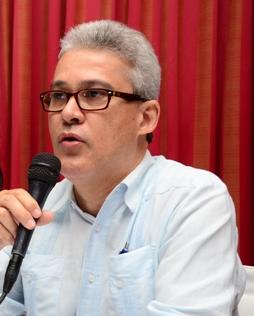From 24-25 April 2012, the National Council for Climate Change and Clean Development Mechanism of the Dominican Republic (CNCCMDL) organized a workshop on “Developing Results-based Action to Strengthen Human Resources, Learning and Skills to Advance Green, Low Emission and Climate Resilient Development”. The workshop was organized within the framework of the National UN CC:Learn Project and brought together more than 50 participants from Government, academia, the private sector, the media, NGOs, youth organizations, UN partners such as the United Nations Development Programme (UNDP), the Food and Agriculture Organization of the United Nations (FAO), and the United Nations Children’s Fund (UNICEF), and other development partners. The workshop also allowed for exploring linkages with ongoing and planned climate change projects, such as the Low-Emission Climate-Resilient Development Strategy (LECRDS) implemented by CNCCMDL with support of UNDP.

The two-day event built on preparatory project activities carried out earlier in the year, including the National UN CC:Learn Planning Workshop, held in February 2012, and background research to identify climate change competencies and learning needs in various sectors. During the workshop, participants identified priority actions in the Dominican Republic to (1) address immediate professional learning needs and (2) strengthen institutional capacites to deliver learning action.
Workshop Opening
Welcome
 Andrés Cedano, FAO; Stephanie Hodge, UNICEF; Adriana Valenzuela, UNITAR; Moisés Álvarez, National Council for Climate Change and Clean Mechanism Development; Luz Maria Mena, Instituto Nacional de Formacion Tecnico Profesional (INFOTEP); José Amado Rodríguez, Ministry of Education.
Andrés Cedano, FAO; Stephanie Hodge, UNICEF; Adriana Valenzuela, UNITAR; Moisés Álvarez, National Council for Climate Change and Clean Mechanism Development; Luz Maria Mena, Instituto Nacional de Formacion Tecnico Profesional (INFOTEP); José Amado Rodríguez, Ministry of Education.
During the Welcome Session, introductory remarks were made by Moisés Alvarez, CNCCMD, Adriana Valenzuela, UNITAR, Stephanie Hodge, UNICEF, Andrés Cedano, on behalf of the UN Country Team, Luz Maria Mena, Instituto Nacional de Formación Técnico Profesional (INFOTEP), and José Amado Rodriguez, Ministry of Education.
In his welcome remarks, Mr. Moisés Alvarez, National UN CC:Learn Coordinator in the Dominican Republic, highlighted that “actions to strengthen the capacity of institutions providing education and training are fundamental for creating green, low emission and climate resilient development’’. He also emphasized the importance of exploring modalities and partnerships for implementing learning actions to be included in the National Strategy.
Session 1: Context and Status of the UN CC:Learn Pilot Project
Mr. Daniel Abreu, focal point of the UN CC:Learn project, CNCCMDL explained the various stages of the UN CC:Learn project. He presented the content of the Background Report prepared through the project, the legal framework of climate change in the Dominican Republic, and initial results of the assessment of learning needs and national capacities to deliver climate change learning.
Session 2: Introduction to Methodology for Designing Result-based Action
Ms. Valenzuela introduced the methodology to develop result-based action. She emphasized that results-based management seeks to ensure that action is systematically linked to, and contributes to achieving development changes, both at the individual and institutional level. She introduced key phases of a project cycle, including project initiation and inception; situation analysis; planning; resource mobilization; implementation; and monitoring and evaluation. She concluded that results-based action identified in the Dominican Republic should be linked to climate change policy priorities, institutional objectives and related initiatives.
Session 3: Integrating Learning within Sectors Concerned with Climate Change
 In Session 3, parallel working groups identified and discussed action to strengthen climate change learning within selected priority sectors, including (a) Education, (b) Energy, (c) Forestry, Agriculture & Water and (d) Tourism. Working groups identified key target audiences, opportunities for action and several cross-sectoral priority topics including: Fundamentals of Climate Change Science, International Climate Change Funding, Adaptation and Climate Resilience, Climate Change and Disaster Risk Management, and Green Economy, Growth and Jobs.
In Session 3, parallel working groups identified and discussed action to strengthen climate change learning within selected priority sectors, including (a) Education, (b) Energy, (c) Forestry, Agriculture & Water and (d) Tourism. Working groups identified key target audiences, opportunities for action and several cross-sectoral priority topics including: Fundamentals of Climate Change Science, International Climate Change Funding, Adaptation and Climate Resilience, Climate Change and Disaster Risk Management, and Green Economy, Growth and Jobs.
Session 4: Developing Action in the Education System to Deliver Learning
Session 4 focused on strengthening institutional capacities to deliver learning in order to ensure that the national education system can respond to learning priorities, for example, by integrating climate change issues into the curricula of general and vocational education and training institutions.
It comprised three lectures and three parallel working groups covering the following topics: (a) Initial, Primary, Secondary and Vocational Education, (b) Higher Education, (c) Public Awareness and non-Formal Education.
Ms. Stephanie Hodge, Education Specialist at UNICEF, showcased climate change and its impacts on children and their learning processes, from an educational standpoint. She added that climate change provides an opportunity to create a vision on education that is all inclusive, integrates climate change in classrooms, and has a life skills approach. Ms. Hodge also emphasized that education is not just about the process of educating but also promoting values. She pointed out that quality education including philosophy content and pedagogy is a pathway to climate education and adaptation. Ms. Hodge also presented different case studies and experiences of education projects implemented in other countries.
Mr. Antuan Cannon, Clean Energy Analyst at Envirolution explained how skills development actions can drive a transition to a green economy. He expressed that a new definition of green economy should reflect a ‘win-win’ approach that strengthens both the workforce and economic development. He proposed energy efficiency, recycling and green buildings as specific areas that could generate green jobs.
Ms. Bilda Valentin, consultant of the CNCCMDL and member of the UN CC:Learn team in the Dominican Republic, presented key concepts related to education and learning. She expressed that in the Dominican Republic, the education curriculum is based on a constructivist approach, which means that knowledge is built, and depends on socio-cultural factors, previous knowledge, opportunities to transform acquired knowledge and the ability to reflect what has been learned.
Conclusions of the working groups highlighted inter alia the importance of:
- Designing a specific action plan on Climate Change Education
- Introducing Climate Change into the curricula at all levels
- Incorporating a life cycle and life skills approach into the National Strategy
- Implementing a UNESCO pilot training course for policy makers, education planners, curriculum development specialists, teacher education institutions and non-formal education trainers.
Session 5: Developing Priority Action for Professional Learning and Skills Development
During Session 5 working groups developed specific learning actions/interventions focusing on learning and skills development. Specific learning actions discussed include: Enhancing Knowledge and Skills of Teachers to Teach Climate Change, Strengthening Skills of Negotiators to Participate in Climate Change Negotiations, Strengthening Skills of Government Staff to Develop Climate Change Proposals, and Raising Awareness of Decision Makers on Climate Risks and Action.
Workshop Summary, Evaluation and Closure
 Moisés Alvarez, CNCCMD
Moisés Alvarez, CNCCMD
In his closing remarks, Moises Alvarez thanked the institutions that have supported the project. He also invited participants to actively engage in all activities organized by UN CC:Learn, including a policy briefing where the results of the workshop would be presented.
He highlighted some principal conclusions of the workshop which include:
- Introducing gender as a cross sectoral issue
- Developing pilot learning actions and projects
- Engaging local authorities in the implementation of the learning activities
- Promoting the use of knowledge management approaches to facilitate knowledge sharing and networking.
About UN CC: Learn
UN CC: Learn is a partnership of 32 multilateral organizations which supports Member States in designing and implementing results-oriented and sustainable learning to address climate change. The Secretariat for UN CC:Learn is provided by UNITAR. An important aspect of UN CC:Learn is to support countries in developing a National Strategy to Strengthen Human Resources and Skills to Advance Green, Low Emission and Climate Resilient Development, through a multi-sectoral and multi-stakeholder process. During the course of 2012-2013, Benin, the Dominican Republic, Indonesia, Malawi, and Uganda are participating as UN CC:Learn pilot countries. Core funding for the 2011-2013 implementation phase of UN CC:Learn is provided by the Swiss Government.

